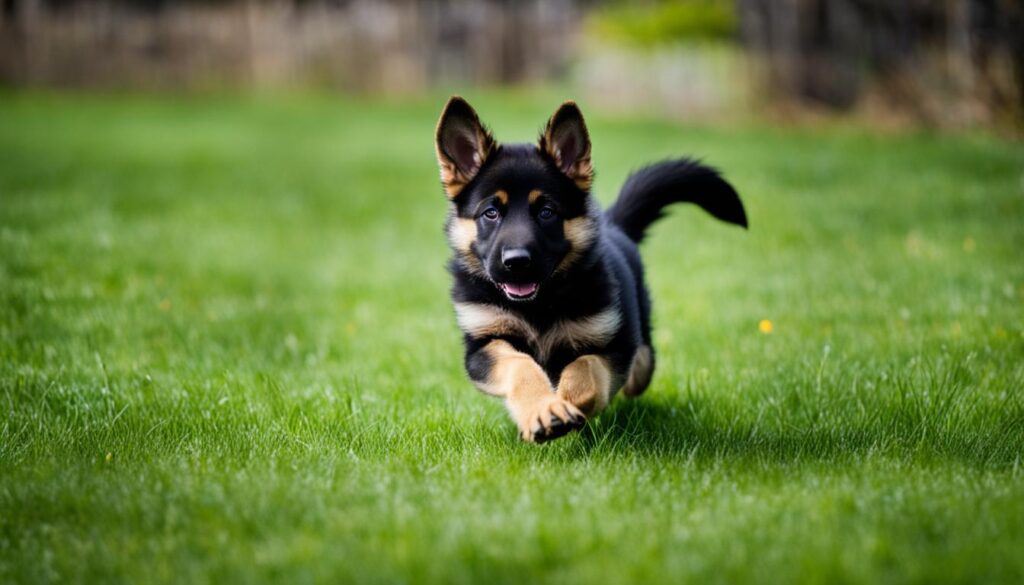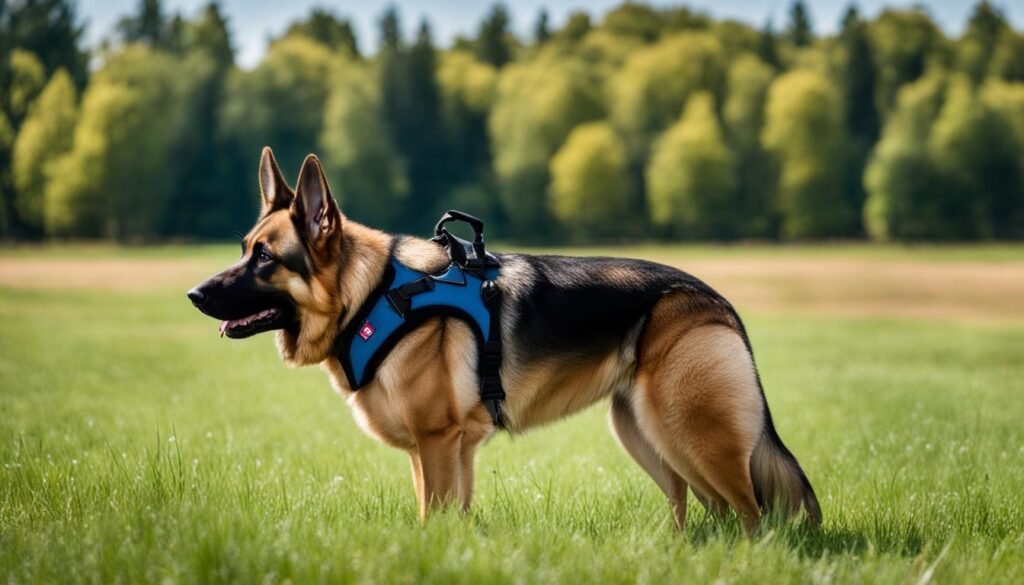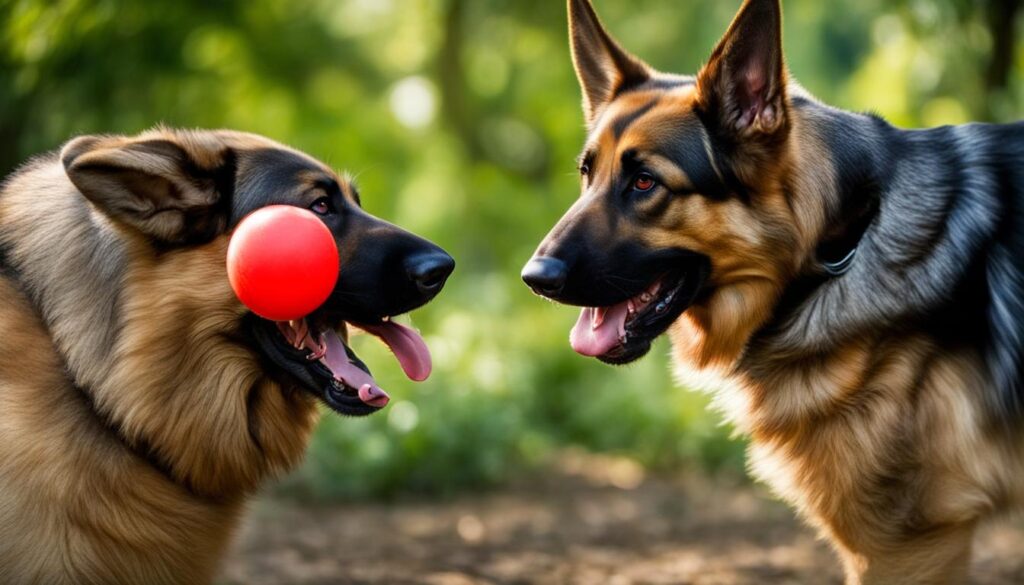German Shepherds are a popular breed known for their intelligence, loyalty, and high-energy levels. If you’re a proud German Shepherd parent, you may be wondering when your furry friend will calm down. The answer depends on several factors, including their puppy behavior, maturity stages, temperament, and breed characteristics.
German Shepherds typically go through several stages of development before reaching maturity. During the first few months, they are considered puppies and may exhibit hyperactive behaviors such as excessive barking, chewing, and jumping. As they grow older, experienced breeders and veterinarians can generalize the breed’s level of energy based on the puppy’s parents and bloodlines.
It’s essential to be patient with your furry friend as they reach their prime. In the following sections, we will discuss German Shepherd puppy behaviors, training methods, exercise needs, and other factors affecting their energy level and when they are expected to calm down.
Key Takeaways:
- German Shepherds go through different stages of development before reaching maturity.
- Factors such as breed, temperament, and training affect their energy levels.
- Proper socialization, training, and exercise can help manage a German Shepherd’s energy.
- German Shepherds usually take between 2-4 years to calm down fully.
- Be patient with your furry friend and enjoy the journey to their mature self.
German Shepherd Puppy Behavior
When it comes to German Shepherd puppies, it’s important to understand their energy levels and typical behaviors. German Shepherd puppies are full of energy and love to play, but they can also be hyperactive and challenging to handle.
One of the reasons why German Shepherd puppies have so much energy is because of their breed characteristics. They were originally bred to be working dogs, which means they have a natural instinct to be active. Additionally, German Shepherds are intelligent dogs that require mental stimulation to stay engaged and happy.
It’s important to provide your German Shepherd puppy with appropriate socialization and training to help manage their energy levels. Some typical behaviors exhibited by German Shepherd puppies include:
- Biting and nipping
- Jumping up on people
- Barking excessively
- Chewing on household items
If left unchecked, these behaviors can become problematic as your puppy grows older. However, with proper training and socialization, you can help control hyperactivity and curb these behaviors.
Proper socialization and training can help manage German Shepherd puppy behavior and prevent future issues.


“A German Shepherd puppy is a bundle of love, energy, and mischief.” – Anonymous
Training, Exercise, and Managing Energy
Training and exercise are vital in managing your German Shepherd’s energetic temperament. Here are some German Shepherd training tips that can help create a more calm and well-behaved dog:
- Start training early: German Shepherds are intelligent and can start learning at a young age.
- Consistency is key: Use the same commands and reward system consistently.
- Positive reinforcement: Use treats and praise to reward good behavior.
- Provide mental stimulation: Puzzle toys and interactive games can channel their energy and improve their mental health.
When it comes to exercise, providing enough physical activity for your German Shepherd is essential. Regular exercise can help reduce excessive energy and keep them healthy. German Shepherd exercise needs can vary based on age, health, and activity level. An adult German Shepherd may need at least an hour of exercise each day. Here are some activities that can help channel their energy:
- Regular walks: Walking is a great way to provide both physical and mental stimulation.
- Hiking: Hiking can provide a change of scenery and added physical challenges.
- Swimming: This low-impact activity is perfect for providing a full-body workout.
- Playing fetch: This classic game can help improve their obedience skills and ability to focus.
Remember to always consult your veterinarian before starting any new exercise routines.
To calm a hyperactive German Shepherd, you can try activities that engage their minds, such as obedience training, agility courses, or playing hide and seek. These activities can help redirect their energy and provide mental stimulation.


Conclusion
Now that you have a better understanding of German Shepherds’ development stages, temperament, behavior, and exercise needs, you can help them reach a more balanced and calmer state as they age. Remember that training and exercise are crucial in managing their energy levels, and consistency is key in achieving the desired results.
By providing your German Shepherd with appropriate mental stimulation, proper training, and regular exercise, you can help them lead a healthy and balanced life, while also strengthening the bond between you and your furry friend.
Always keep in mind their breed characteristics and needs, and never hesitate to seek professional help if needed. With patience and effort, you can enjoy a harmonious and rewarding relationship with your German Shepherd for years to come. So, when do German Shepherds calm down? With proper care and attention, it won’t be long until you see them mellowing out and becoming your faithful companion for life.
FAQ
When do German Shepherds calm down?
German Shepherds typically start to calm down around 2 to 3 years of age. However, it’s important to note that each dog is unique and may exhibit different levels of energy and maturity.
What are some common German Shepherd puppy behaviors?
German Shepherd puppies are known for being energetic, playful, and sometimes mischievous. They may exhibit behaviors such as biting, chewing, jumping, and excessive barking.
How can I address and control my German Shepherd puppy’s hyperactivity?
To address a hyperactive German Shepherd puppy, it’s important to provide them with proper socialization, exercise, and mental stimulation. Enroll them in puppy training classes, engage them in interactive play, and provide them with plenty of toys and activities to keep their minds occupied.
What training techniques are effective for German Shepherds?
German Shepherds are intelligent and eager to please, making them highly trainable. Positive reinforcement training methods, such as reward-based training and clicker training, work well for this breed. Consistency, patience, and positive reinforcement will help them learn and respond effectively.
How much exercise do German Shepherds need?
German Shepherds are an active breed and require regular exercise to meet their energy needs. They benefit from daily activities such as long walks, jogging, fetching games, and mentally stimulating exercises like obedience training or puzzle toys. Aim for at least 1-2 hours of exercise daily to keep them physically and mentally satisfied.
What are some key breed characteristics of German Shepherds?
German Shepherds are known for their loyalty, intelligence, and protective nature. They are highly trainable and often used in various roles such as police dogs, search and rescue dogs, and service dogs. They have a strong work drive and thrive when given a job or task to perform.
How can I help my German Shepherd reach a more balanced and calm state?
Providing your German Shepherd with proper training, exercise, socialization, and mental stimulation will help them reach a more balanced and calm state as they mature. Be patient, consistent, and provide a structured routine to help them thrive and become well-rounded dogs.

